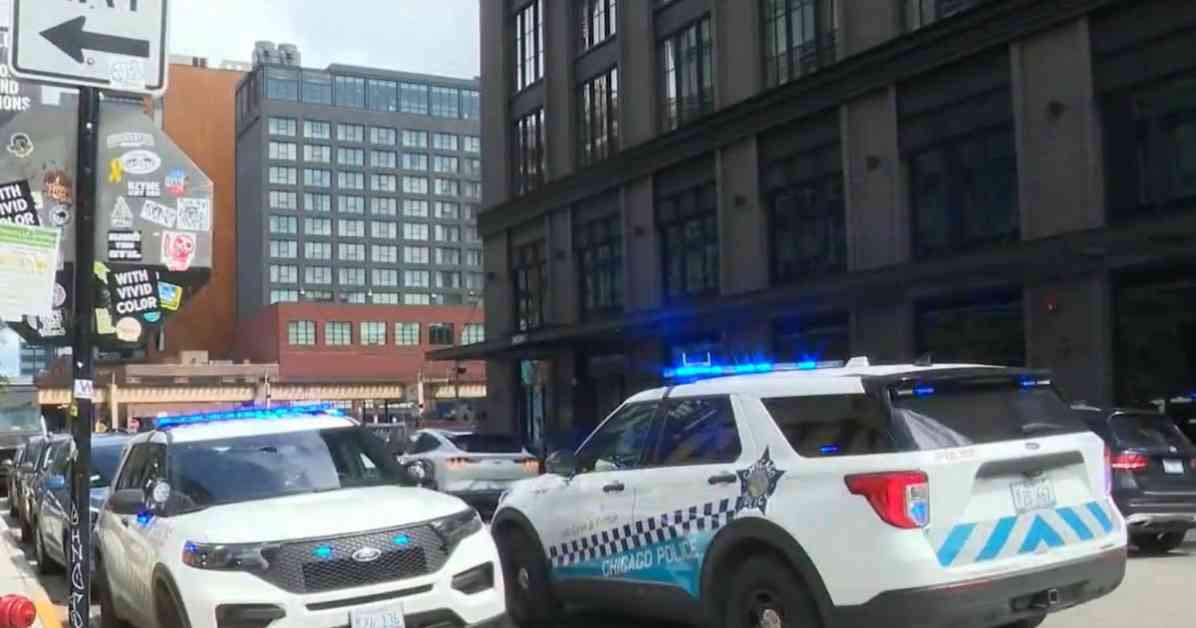Security Concerns at Democratic National Convention Hotels: Bomb Threats and Anti-Semitism Reported
As the Democratic National Convention kicks off in Chicago, security concerns have arisen at hotels hosting the event. Reports of bomb threats and anti-Semitic statements have put law enforcement on high alert as they work to ensure the safety of attendees and residents in the area.
Police in Chicago are currently investigating anti-Semitic statements and warnings of pipe bombs being placed at multiple hotels near the convention site. The Nobu Hotel, which is hosting the convention where Kamala Harris is set to be officially recognized as the Democratic nominee, was one of the locations targeted by these threats. Other hotels reportedly affected include the Hotel Chicago West Loop, Hyatt House Chicago in West Loop, and the University District.
Law enforcement officers, accompanied by K-9 units, conducted thorough searches of the premises following the threats. Despite the urgency of the situation, no suspicious objects were immediately found. The presence of police cars around North Peoria Street was a visible reminder of the heightened security measures in place.
The timing of these threats is particularly concerning, as they came just hours before former President Barack Obama was scheduled to speak at the convention. His wife, former First Lady Michelle Obama, was also slated to address the audience. President Joe Biden, in his opening night speech, made a passionate plea for voters to support Harris in order to protect democracy from the threats posed by her opponent, former President Donald Trump.
The reported bomb threats coincided with ongoing protests surrounding the convention venue. Thousands of individuals marched through the streets, expressing their displeasure with the Biden administration’s stance on the conflict in Gaza. They called on Harris to advocate for an end to the violence and work towards a peaceful resolution.
Despite the security challenges and protests, the convention is set to continue as planned, culminating in Harris’ highly anticipated address on Thursday. Former President Bill Clinton and Harris’ vice presidential running mate, Tim Walz, are among the notable speakers scheduled to take the stage in the coming days.
As law enforcement agencies work tirelessly to ensure the safety of all involved, the incident serves as a stark reminder of the security risks associated with large-scale political events. The need for vigilance and preparedness in the face of potential threats remains paramount to safeguarding the democratic process and protecting the well-being of all individuals involved.
Challenges of Ensuring Security at Political Conventions
Political conventions, by their nature, attract a wide range of attendees, from high-profile politicians to grassroots activists. The convergence of diverse groups and ideologies in one location can create a volatile environment where security risks are heightened. In recent years, incidents of violence and threats have become more common at political events, underscoring the need for robust security measures to be in place.
The Democratic National Convention, with its focus on nominating a presidential candidate and setting the party’s agenda, is a particularly high-stakes event. The presence of prominent political figures, media personnel, and delegates from across the country adds to the complexity of ensuring safety and order. The recent bomb threats and anti-Semitic statements directed at convention hotels highlight the challenges faced by law enforcement in maintaining security in such a dynamic and fluid environment.
The Impact of Security Threats on Public Safety
The safety and well-being of attendees, hotel guests, and local residents are of utmost importance in situations where security threats are present. The psychological impact of bomb threats and anti-Semitic statements can create fear and anxiety among individuals, leading to heightened tension and unease in the community. Ensuring public safety requires a coordinated effort between law enforcement agencies, event organizers, and relevant stakeholders to address and mitigate potential risks effectively.
The presence of police officers and K-9 units conducting searches at the convention hotels signifies a proactive approach to addressing the security concerns at hand. By responding swiftly and decisively to reported threats, law enforcement agencies demonstrate their commitment to safeguarding the lives and property of those in attendance. The collaborative efforts of local authorities and federal agencies play a crucial role in enhancing security measures and maintaining a safe environment for all individuals involved.
Addressing Anti-Semitism and Hate Speech
The emergence of anti-Semitic statements in conjunction with the bomb threats at the Democratic National Convention hotels is a troubling reminder of the persistence of hate speech and bigotry in society. Acts of discrimination and prejudice have no place in a democratic and inclusive society, and must be unequivocally condemned by all individuals and institutions. The targeting of individuals or groups based on their religion, ethnicity, or beliefs runs counter to the values of tolerance and respect that form the foundation of a diverse and multicultural society.
In the face of such divisive rhetoric, it is essential for community leaders, political figures, and the general public to stand united against hate and intolerance. Promoting dialogue, understanding, and mutual respect can help counteract the spread of hateful ideologies and foster a climate of inclusivity and acceptance. By confronting anti-Semitism and hate speech head-on, society can work towards building a more harmonious and cohesive community for all its members.
The incidents of bomb threats and anti-Semitic statements at the Democratic National Convention hotels serve as a stark reminder of the challenges and complexities associated with ensuring security at high-profile political events. By remaining vigilant, proactive, and collaborative in their efforts, law enforcement agencies and event organizers can help mitigate risks and safeguard the well-being of all individuals involved. As the convention continues, the focus remains on upholding the principles of democracy, inclusivity, and safety for all participants and attendees.












